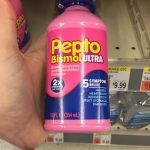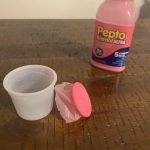Can I Take Pepto Bismol While Breastfeeding?

According to the CDC, breast milk is designed to provide the appropriate amount of calories and optimal nutrition to support the growth and health of the infant. However small amounts of what you’re eating and drinking including prescription medication, over-the-counter drugs, and supplements can pass to your baby through your breast milk.
Certain drugs such as alcohol, some illegal drugs, and some prescription and over-the-counter medications are known to cause problems if taken while you are breastfeeding
Stomach upset and nausea is common during those first few weeks of breastfeeding when you are also extremely tired and may forget to drink enough liquids (causing dehydration) or skip meals. Knowing which medications are safe to take can provide relief and prevent complications for your breastfeeding child.
What is Pepto Bismol?
Pepto Bismol is a common over-the-counter (OTC) drug that may help control occasional symptoms of simple digestive issues, such as indigestion, heartburn, and diarrhea.
Pepto Bismol is an antacid. It is available in a variety of forms, including capsules and liquids, and comes in a range of strengths. Some people may experience specific side effects, such as very dark or black stool, after taking Pepto Bismol. However, these side effects are generally temporary and harmless.
The drug may also interact with other medications, such as anticoagulants, or blood thinners. A person should only use Pepto Bismol or similar products for a short period to treat occasional symptoms. Anyone dealing with chronic digestive symptoms should speak with their doctor.
How it works
Pepto-Bismol is thought to treat diarrhea by:
- increasing the amount of fluid your intestines absorb
- reducing inflammation and overactivity of your intestines
- preventing your body’s release of a chemical called prostaglandin that causes inflammation
- blocking toxins produced by bacteria such as Escherichia coli
- killing other bacteria that cause diarrhea
The active ingredient, bismuth subsalicylate, also has antacid properties that can help decrease heartburn, upset stomach, and nausea.
Can I take Pepto Bismol while breastfeeding?
No, avoid Pepto Bismol while breastfeeding because studies have shown that Pepto Bismol can pass to the infant through breast milk, and trigger fluid loss caused by diarrhea that may result in a severe condition.
In addition, Pepto Bismol should also be avoided during the second and third trimesters of your pregnancy according to a 2014 review in American Family Physician, because it raises your risk of bleeding problems when you take it closer to delivery.
What are the side effects associated with using Pepto-Bismol?
Side effects of Pepto-Bismol include:
• abdominal pain
• anal discomfort
• anxiety
• black or ‘hairy’ tongue
• clay-colored or gray-black stools
• cold symptoms (stuffy nose, sneezing, sore throat)
• confusion
• constipation (may be chronic)
• dark urine
• depression
• diarrhea (may be severe, watery, or bloody)
• dizziness
• sores in the stomach lining
• indigestion
• gas (flatulence)
• gastrointestinal bleeding
• headache (may be severe)
• difficulty falling asleep (insomnia)
• itching
• loss of appetite
• dark sticky feces
• lightheadedness
• metallic taste in your mouth
• mild diarrhea
• mouth pain
• muscle spasm
• nausea
• damage to the brain or nervous system
• pain
• pain behind your eyes
• pale skin
• numbness and tingling
• rapid heart rate
• ringing in your ears (tinnitus)
• seizure (convulsions)
• severe allergic reaction
• shortness of breath
• sinusitis
• stomach pain
• swollen tongue
• taste perversion
• trouble concentrating
• trouble swallowing
• upper respiratory tract infection
• vaginal itching or discharge
• vision problems
• vomiting
• weakness
• yellowing of the skin or eyes (jaundice)
This document does not contain all possible side effects and others may occur. Check with your physician for additional information about side effects.
Pepto Bismol Warnings
• Tell your doctor if you are pregnant or breastfeeding, or if you have diabetes, gout, arthritis, or bloody or black stools.
• Do not give this medicine to a child or teenager who has chicken pox or symptoms of a virus or the flu, unless your doctor has told you to. This medicine may cause a rare but serious illness called Reye syndrome.
• This medicine can cause diarrhea. Call your doctor if diarrhea becomes severe, does not stop, or is bloody. Do not take any medicine to stop diarrhea until you have talked to your doctor. Diarrhea can occur for 2 months or more after you stop taking this medicine.
• Call your doctor if your symptoms do not improve or if they get worse. If you still have diarrhea after you have been using this medicine for 2 days, stop using it and call your doctor.
• Your tongue or stools may become dark when you use this medicine. This is only temporary and will not hurt you. Ask your doctor about this if you have any concerns.
• Keep all medicine out of the reach of children. Never share your medicine with anyone.
Pepto Bismol Interactions
• Do not use this medicine if you are also using another salicylate medicine, such as aspirin.
• Some medicines can affect how Pepto Bismol works. Tell your doctor if you are taking any of the following: Arthritis medicine, Blood thinner medicine, such as warfarin, Diabetes medicine, and Gout medicine
• This medicine can cause diarrhea. Call your doctor if diarrhea becomes severe, does not stop, or is bloody. Do not take any medicine to stop diarrhea until you have talked to your doctor. Diarrhea can occur for 2 months or more after you stop taking this medicine.
• Call your doctor if your symptoms do not improve or if they get worse. If you still have diarrhea after you have been using this medicine for 2 days, stop using it and call your doctor.
• Your tongue or stools may become dark when you use this medicine. This is only temporary and will not hurt you. Ask your doctor about this if you have any concerns.
• Keep all medicine out of the reach of children. Never share your medicine with anyone.





